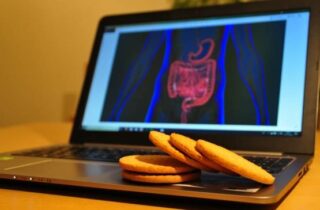Q Exchange
A More Digestible Patient Pathway
- Proposal
- 2019

Meet the team
Also:
- Dr Penny Neild - Consultant Gastroenterologist
- Phil Lunn - Interim General Manager, Specialist Medicine
- Claire Benjamin - Programme Manager
What is the challenge your project is going to address and how does it connect to your chosen theme?
With current long and inefficient pathways GI patients can wait weeks to attend a clinic, only to be told they should really be somewhere else.
GI conditions are treated through multiple medical and surgical pathways and specialties making it unclear for GPs where to refer GI patients, especially when the patient presents with vague symptoms.
Many of our services are outdated, difficult to navigate and don’t meet the needs of our patients; patients often experience delays, long pathways and difficulty being able to access the right person. Our patient experience survey responses tell us we can do better.
To improve the care we provide our patients we will design a single point of access referral portal at the front of the pathway and we will iteratively design protocols to ensure that patients receive the right service, promptly
What does your project aim to achieve?
The project aims to streamline GI referral pathways enabling a more joined up care experience for patients and a clear referral process for GPs. The main objective is to define and setup a new service with a new single point of access for all GI referrals, underpinned by research and testing to achieve the key deliverables:
- Clear information presentation for GPs
- Patient triage system based on effective clinical protocols for decision making
- Workforce redesign to optimise consultant time
- Clearly defined clinical pathways
18,500 patients are referred into our digestive disese services every year. RTT is non-compliant for both specialties concerned. We anticipate and will measure the following benefits for these patients:
- Shorter patient pathways as patients will be on the correct pathway from the outset
- Fewer hospital attendances through front loading investigations where possible
- An increase in the number of patients managed on a virtual pathway
- Reduced duplication
- Improved GP experience
How will the project be delivered?
The project will be delivered through collaborative co-design including patients, GPs, Gastroenterologists and GI surgeons. Project support will be provided by the Quality Improvement Academy.
Using our QI methodology we will process map to find the current issues and opportunities. We will learn from successes and failures following PDSA tests of change approach, steadily improving our processes and protocols.
We will identify key patient conditions and design protocols and pathways to support the best care for each of these. A multi-specialty team will review all referrals and co-ordinate the patient pathway. The aim – after 6 months of intensive learning – is to have a robust clinically proven model that enables our patients to get the care they need quickly and without frustration or delay.
To mitigate any risk from patient concerns during the period of change we will set up a dedicated information telephone line as an enabler for improved patient communication.
What and how is your project going to share learning throughout?
The project will take a collaborative design approach – sharing with wider groups across the local South West London (SWL) system as we progress.
Following a PDSA approach will offer continuing learning cycles throughout the project. The major PDSA tests of change will be captured using our standard post implementation report format that captures detail including measurable impact that can be shared across the community.
In developing the robust clinically proven referral model we will consolidate expertise & unique project insights that can be shared.
Our immediate avenues for sharing are the network already in place following the introduction of an enhanced triage model in gastroenterology co-designed with GPs, other Trusts within the South West London Acute Provider Collaborative program and specific conferences/ forums where we can share knowledge and success including the flow coaching academy.
How you can contribute
- We will look for wider subject expertise and seek out other expert opinion – especially from any similar projects
- As we produce information for sharing we will look for feedback and support for wider communications
- Using the Q platform for on-going discussion and dialogue gives an opportunity to engage critical friend challenge to ensure focus – we will ask relevant questions to the community as they arise
- Engagement and collaboration outside of our local SWL system through the Q Community
Plan timeline
| 31 Oct 2019 | Initial stakeholder engagement |
|---|---|
| 30 Nov 2019 | Clinical audit to provide baseline for effectiveness |
| 30 Nov 2019 | Complete process mapping of current and future state |
| 30 Nov 2019 | Develop new IT workflows and infrastructure |
| 31 Dec 2019 | Develop new triage protocols |
| 31 Jan 2020 | Develop streamlined GI Pathways |
| 31 Jan 2020 | Launch tests with pilot GP practices |
| 29 Feb 2020 | Evaluate tests & share |
| 30 Apr 2020 | Complete Patient & GP feedback |
| 30 Apr 2020 | Complete benefits review |
Comments
Jonathan Grellier 26 Jul 2019
Great idea Ed! This will benefit from the learning from the work already being done by the Acute Provider Collaborative in SW London. Might be worth looking at the NHSE Elective Care Transformation programme - there may be some shared learning to build on. Also, there is an online Elective Care Community of Practice that might be a good resource for collaboration.
Comments are now closed for this post.